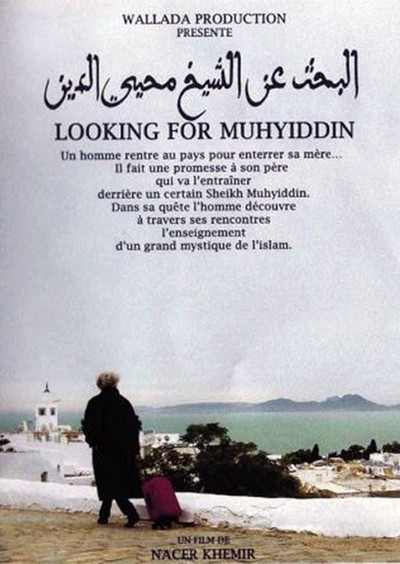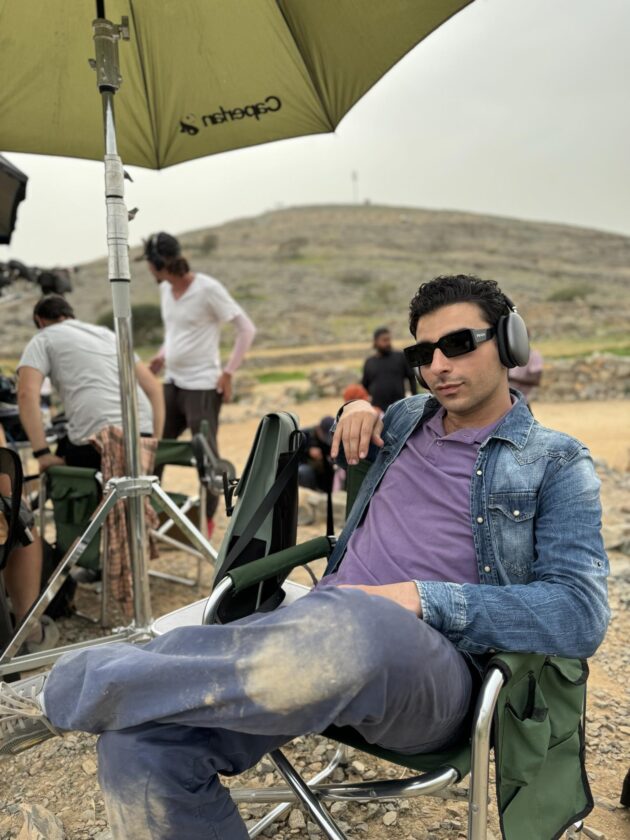Director of well-received films such as ‘Bab-Âziz,’ ‘The Dove’s Necklace’ and ‘Wanderers of the Desert,’ Tunisian director Nacer Khemir’s new film, ‘Looking for Muhyiddin,’ depicts the life of the great Islamic philosopher Muhyiddin ibn-i Arabi and premieres in Turkey soon.
Tunisian director Nacer Khemir is preparing for the release of his movie, “Looking for Muhyiddin,” which focuses on the life of Muhyiddin İbn-i Arabi, in Turkey.
Speaking to Anadolu Agency (AA), the famous director who is known for his movies, including “Bab’Aziz,” “The Dove’s Lost Necklace,” and “Wanderers of the Desert,” noted that losing his dad at an early age was the reason he became interested in cinema. He visited Paris in his 20s with a scholarship from UNESCO and realized at an early age that a Western approach in movies is wiping out his own history and tradition, and since cinema is an impressive method to explain, tell and prove things, he chose to stay true to his roots.
Khemir also expressed that cinema causes an image problem: The image of Islam, which needs to be reshaped before the eyes of the Western world.
“We cannot live in this day and age without an image,” Khemir said, adding that Muslims unfortunately do not attach the required amount of significance on the problem of image.
“We are required to create a new image and show this not to just one country but to the whole world. I waited 10 years to shoot Bab’Aziz. Now, it’s a movie that addresses and is understood by the whole world. Someone without an image cannot have a face; they cannot represent anyone. That is why I make movies; to create an image for a culture,” he said.
He gave the example of the U.S., which spent millions of dollars to save Europe after World War II, in return for tax-free screenings of American movies in European theaters. Yet, according to Khemir, the Islamic world only focused on establishing factories while image is a much more important issue that needs to be valued and also, awareness about it should be made among Muslims.
Pointing out that the story in movies should not just address the body but the soul as one of the main purposes of filmmaking is to show audiences the beauties of the world, Khemir highlighted the importance of raising a generation that produces its own unique movies.
“We cannot leave cinema in the hands of nonprofessionals. We need to strive for ‘our cinema,’ which means we need to work on our image. Let alone being becoming a nominee at festivals, ‘Bab’Aziz’ is not even screened anywhere as they are aware that this movie has a different voice and they do not want to announce that we have a different voice. Image is indeed a big war,” Khemir said.
Resembling cinema to language, the master movie director said more work needs to be done on the resources and language of cinema as all cultures build their own language and motives. According to him, if Muslims want to reveal their vision to the world, then, they need to develop a cinematic language, which requires more field work.
“We also thought cinema was a technical business which we can learn from the West, yet, now one can shoot a movie by their cell phones, meaning technique lost its previous importance,” he noted.
The director, who is also interested in Islamic Sufism, shot the movie “Looking for Muhyiddin” three years ago to depict the life of Muhyiddin ibn-i Arabi, the Islamic philosopher.

The director traveled all around the world to meet with experts on Arabi and the result was a movie that takes place in different languages and features six languages. The movie was shot in Yemen, Tunisia, Damascus, Konya, Istanbul, Bursa, Spain, France, New York and the U.K. as the director thought the best way to bring this philosopher’s life to the screen would be to hear about him from those who are interested in his philosophy.
“It was great to find out why a Spanish person or a British graduate of Oxford would be interested in his life,” Khemir said.
He worked with Professor Mahmut Erol Kılıç, a Turkish theologian working on Muhyiddin ibn-i Arabi, which, according to the director, was very fruitful. Khemir expressed how pleased he was to get to know this great Muslim philosopher better and currently he has instructed for Turkish subtitles to be prepared so that the movie can be released in Turkey.
According to Khemir, the colonialist mentality still survives in Europe and that one of the leading countries that could stand tall against the West is Turkey, with its geographical power.
“Islam’s success depends on Turkey. There are those who believe that they can only secure justice through fighting such as Daesh, who are at a dead end. Islam has spread not with guns but with trade and dialogue. And this is a historical fact,” Khemir noted.
He further said that an aware generation can only be raised with education and stated his desire to open a “Civilization School” that raises an intellectual generation who can find solutions to problems they face as they will have both a social, political and intellectual responsibility.
“We need to reshape this geography; we cannot find answers if we do not examine the problems. What is more threatening is that a young citizen without training may in the end turn against their own country,” he added.
The director reminded that last year he shot a movie about what the Muslim world has lost and that especially young people have lost their pasts and their future, which might also be scary. He expressed his fear about the future and how he contemplates about what can be done to change this course, which may be the demise of future generations.
In his new movie, “Whispering Sands,” written and directed by Khemir, he again worked with Armand Amar, who composed the soundtrack of “Bab’Aziz” and the cast consisted mostly of villagers instead of professional actors.
While the movie is set in the Eastern World, the director observed that it does not actually describe the world of Islam other than some small side stories which are linked to Islamic Sufism. The director views his movie as interwoven stories that builds itself on its own, not one by built by the director.
“Whispering Sands” is about an Arab origin Canadian woman’s trip and hires a guide in search for a location in the Tunisian dessert. In order to make her reveal her secret, the guide tells her Sufism stories, which inspired him during his childhood. In the middle of the desert, the woman reveals her secret and the carefree guide finds out that his children have been freed from the country during their trip. Before facing a deadly future, he first has to catch his children





Comments are closed.